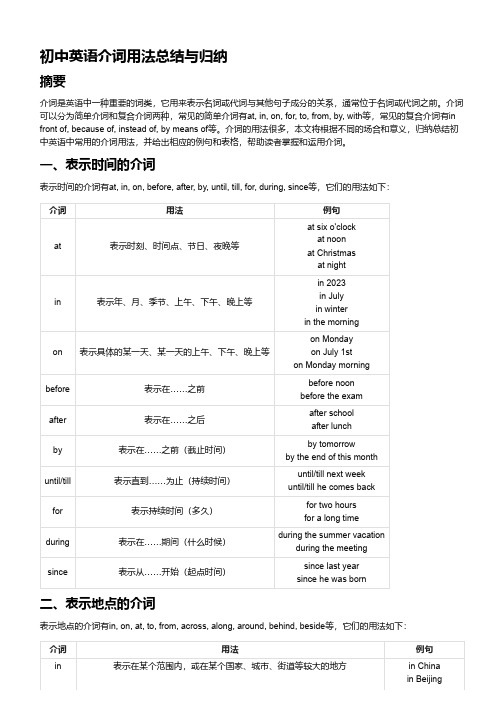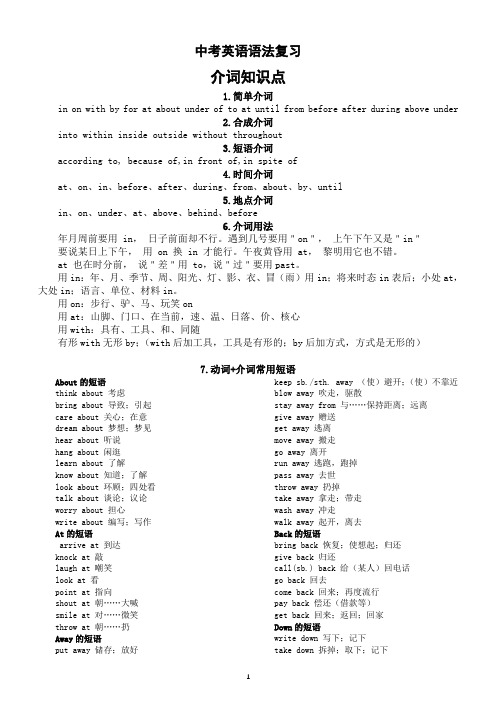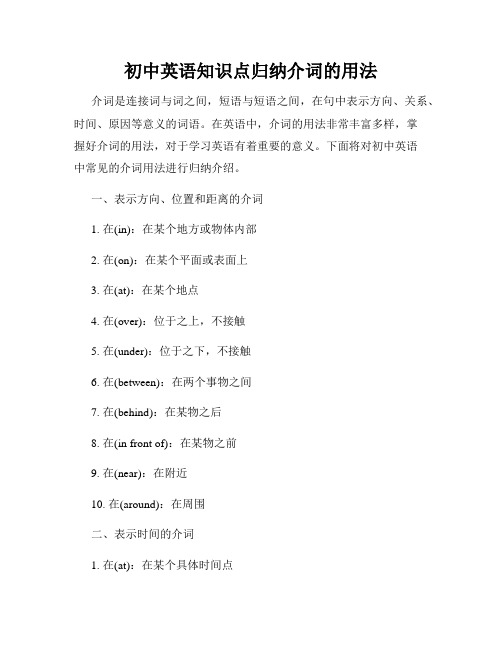初中英语介词复习
- 格式:doc
- 大小:85.00 KB
- 文档页数:18

初中英语介词用法总结与归纳摘要介词是英语中一种重要的词类,它用来表示名词或代词与其他句子成分的关系,通常位于名词或代词之前。
介词可以分为简单介词和复合介词两种,常见的简单介词有at, in, on, for, to, from, by, with等,常见的复合介词有in front of, because of, instead of, by means of等。
介词的用法很多,本文将根据不同的场合和意义,归纳总结初中英语中常用的介词用法,并给出相应的例句和表格,帮助读者掌握和运用介词。
一、表示时间的介词表示时间的介词有at, in, on, before, after, by, until, till, for, during, since等,它们的用法如下:介词用法例句at表示时刻、时间点、节日、夜晚等at six o'clock at noonat Christmas at nightin表示年、月、季节、上午、下午、晚上等in 2023in Julyin winterin the morningon表示具体的某一天、某一天的上午、下午、晚上等on Mondayon July 1ston Monday morningbefore表示在……之前before noon before the examafter表示在……之后after school after lunchby表示在……之前(截止时间)by tomorrowby the end of this monthuntil/till表示直到……为止(持续时间)until/till next week until/till he comes backfor表示持续时间(多久)for two hours for a long timeduring表示在……期间(什么时候)during the summer vacation during the meetingsince表示从……开始(起点时间)since last year since he was born二、表示地点的介词表示地点的介词有in, on, at, to, from, across, along, around, behind, beside等,它们的用法如下:介词用法例句in表示在某个范围内,或在某个国家、城市、街道等较大的地方in Chinain Beijing介词用法例句in ZhongshanRoadon表示在某个表面上,或在某个楼层、台阶等较小的地方,或在某个方位上on the wall on the secondflooron the left/rightat 表示在某个具体的位置或地点,或在某个机构、场所等较小的地方,或表示靠近、附近等at the cornerat schoolat the bus stopto表示朝向某个方向或地点,或表示到达某个地点(范围之外)to the east to Japan to schoolfrom表示从某个地点出发或离开(范围之外)from home from Shanghai from Chinaacross表示横穿或穿过(从一边到另一边)across the street across the riveralong表示沿着或顺着(在一边)along the road along the riveraround表示围绕或环绕(在四周)around the lake around the worldbehind表示在……后面behind the door behind himbeside表示在……旁边beside the window beside her三、表示方向的介词表示方向的介词有to, from, into, out of, onto, off, up, down, through等,它们的用法如下:介词用法例句to表示朝向某个方向或地点,或表示目的地He is going to Beijing. She gave the book to me.from表示从某个方向或地点出发或离开,或表示来源He came from the south. This is a gift from my friend.into表示进入某个范围或空间(由外到内)He jumped into the water. She put the flowers into the vase.out of表示离开某个范围或空间(由内到外)He ran out of the room. She took the book out of the bag.onto表示移动到某个表面上(由低到高)He climbed onto the roof. She threw the ball onto the ground.off表示从某个表面上移开(由高到低)He fell off the bike. She took off her hat.up表示向上移动(由低到高)He went up the hill.介词用法例句She climbed up the ladder.down表示向下移动(由高到低)He came down the stairs. She slid down the slide.through表示穿过某个空间或物体(从一端到另一端)He walked through the forest. She looked through the window.四、表示方式、手段、工具的介词表示方式、手段、工具的介词有by, with, in, on等,它们的用法如下:介词用法例句by 表示交通工具、方式、方法等,或表示被动语态的动作执行者,或表示时间的截止点,或表示计量单位等by busby mistakeby himby tomorrowby weightwith 表示使用某种工具、器具、材料等,或表示伴随的人或物,或表示具有某种特征、状态等,或表示原因、理由等with a knifewith hisparentswith long hairwith joyin 表示使用某种语言、文字、颜色等,或表示穿着某种衣服,或表示处于某种状态、情况等,或表示在某种范围内等in Englishin black andwhitein a red dressin a hurryin generalon 表示使用某种电子设备、媒体等,或表示依靠某种力量、条件等,或表示以某种方式等,或表示参与某种活动等on TVon footon fireon dutyon holiday五、表示原因、目的、结果的介词表示原因、目的、结果的介词有for, at, from, of, with, by, because of, owing to, thanks to, out of, through等,它们的用法如下:介词用法例句for 表示原因、理由,常与sorry, famous, punish, praise, thank, blame等连用,也表示目的、意图,常与hope, wish, wait, look, come, go等连用,也可以表示用途、功能等for peacefor helpfor a walkfor funfor cutting paperat表示目的、意图,常与surprised, shocked, amazed, good, bad等连用,也可以表示针对、针对性等at his words at the news at math介词用法例句at solvingproblemsfrom 表示结果、效果,常与different, far, free, safe等连用,也可以表示来源、出发点等from the picturefrom now onfrom dangerfrom birthof 表示原因、理由,常与afraid, proud, sure, tired等连用,也可以表示所属、属性、特征等of the darkof himof the resultof his workwith 表示原因、理由,常与pleased, satisfied, angry, happy等连用,也可以表示伴随、方式、工具等with the answerwith himwith a smilewith a knifeby 表示方式、方法、手段等,也可以表示被动语态的动作执行者,或表示时间的截止点,或表示计量单位等by doing thisby himby tomorrowby weightbecauseof 表示原因、理由,相当于一个从句,后面接名词或代词等because of therainbecause of thatowing to表示原因、理由,相当于一个从句,后面接名词或代词等owing to the trafficjamowing to hisillnessthanks to表示原因、理由,含有感激或讽刺的意味,后面接名词或代词等thanks to yourhelp thanks to his carelessnessout of表示原因、理由,含有出于某种动机或感情的意味,后面接名词或代词等out of curiosity out of pitythrough表示原因、理由,含有经过某种过程或方式的意味,后面接名词或代词等through hard work through a window六、表示对象、范围的介词表示对象、范围的介词有of, for, about, with, to, from, among, between等,它们的用法如下:介词用法例句of表示所属、属性、特征等,也可以表示分离、脱离等the color of the skya cup of teaa friend of mineget rid of itfor表示目标、对象、受益者等,也可以表示目的、原因等 a gift for youa seat for twoa doctor for the poora room for rentabout表示主题、内容、话题等,也可以表示大约、左右等a book about history tell me about yourself about ten minuteswith表示伴随、陪同等,也可以表示方式、工具等stay with mea man with glasses speak with a loud voice cut it with a knifeto表示方向、目的地等,也可以表示对象、接受者等go to school fly to London say hello to him give it to herfrom表示来源、出发点等,也可以表示对象、对比者等come from Chinaa letter from my father different from youlearn from himamong表示在三个或三个以上的人或物之间(内部)share it among yourselves a flower among the grassbetween表示在两个人或物之间(内部或外部)sit between thema river between two mountains七、其他常用的介词除了上述介词外,还有一些其他常用的介词,如as, like, except, without, beyond, above, below, over, under等,它们的用法如下:介词用法例句as表示身份、职业、角色等,也可以表示方式、方法、程度等as a teacher as usual as you know as well aslike表示相似、类似等,也可以表示喜欢、喜爱等like a birdlike father, like sonI like music.except表示除……之外(不包括)everyone except me every day except Sundaywithout表示没有、缺少等without money without water without a wordbeyond表示超出、超过等beyond the wall beyond my expectation beyond controlabove表示在……之上(不接触)above the ground above sea levelabove allbelow表示在……之下(不接触)below the surface below zero below averageover表示在……之上(覆盖或接触)over the bridge over his head over the phoneunder表示在……之下(覆盖或接触)under the tree under his arm under the weather。

中考英语语法复习介词知识点1.简单介词in on with by for at about under of to at until from before after during above under2.合成介词into within inside outside without throughout3.短语介词according to, because of,in front of,in spite of4.时间介词at、on、in、before、after、during、from、about、by、until5.地点介词in、on、under、at、above、behind、before6.介词用法年月周前要用 in,日子前面却不行。
遇到几号要用"on",上午下午又是"in"要说某日上下午,用 on 换 in 才能行。
午夜黄昏用 at,黎明用它也不错。
at 也在时分前,说"差"用 to,说"过"要用past。
用in:年、月、季节、周、阳光、灯、影、衣、冒(雨)用in;将来时态in表后;小处at,大处in;语言、单位、材料in。
用on:步行、驴、马、玩笑on用at:山脚、门口、在当前,速、温、日落、价、核心用with:具有、工具、和、同随有形with无形by;(with后加工具,工具是有形的;by后加方式,方式是无形的)7.动词+介词常用短语About的短语think about 考虑bring about 导致;引起care about 关心;在意dream about 梦想;梦见hear about 听说hang about 闲逛learn about 了解know about 知道;了解look about 环顾;四处看talk about 谈论;议论worry about 担心write about 编写;写作At的短语arrive at 到达knock at 敲laugh at 嘲笑look at 看point at 指向shout at 朝……大喊smile at 对……微笑throw at 朝……扔Away的短语put away 储存;放好keep sb./sth. away (使)避开;(使)不靠近blow away 吹走,驱散stay away from 与……保持距离;远离give away 赠送get away 逃离move away 搬走go away 离开run away 逃跑,跑掉pass away 去世throw away 扔掉take away 拿走;带走wash away 冲走walk away 起开,离去Back的短语bring back 恢复;使想起;归还give back 归还call(sb.) back 给(某人)回电话go back 回去come back 回来;再度流行pay back 偿还(借款等)get back 回来;返回;回家Down的短语write down 写下;记下take down 拆掉;取下;记下1break down 停止运转;(机器等)出故障turn down 把调低;关小;拒绝calm down 冷静下来cut down 砍倒;缩减die down 减弱;逐渐平息fall down 倒塌;跌倒lie down 躺下pull down 拆除;摧毁put down 放下;记下sit down 坐下slow down (使)减速;(使)放松For的短语search for 搜索;查找thanks for 因……而感激die for 为而死care for 照顾;关怀look for 寻找leave for 动身去pay for 为……付钱stand for 代表prepare for 为……做准备wait for 等待Off的短语burn off 燃烧turn off 关掉cut off 切断;中断break off 突然中止;中断give off 散发;释放get off 下车keep off (使)不接近;远离go off 熄灭;响起put off 推迟;拖延pay off 还清(欠款);成功see off 送行run off 跑掉;逃跑show off 炫耀;显摆set off 动身;启程;使爆炸take off 脱下衣服;(飞机等)起飞shut off 关闭;停止运转On的短语hold on 等一等(别挂电话)pass on 传递keep on 继续(进行)try on 试穿take on 承担;呈现work on 从事;忙于agree on 对意见……一致come on 加油carry on 继续call on 访问;拜访depend on 依靠;依赖;视……而定;取决于decide on 决定;选定get on 上车;进展go on 继续live/feed on 以……为食;靠……谋生put on 穿上;增重;上演turn on 打开Up的短语drive up 开车end up 最终;结束;到头来fill up 装满;填补fix up 修理give up 放弃make up 编造;化妆pick up 接(某人);捡起look up 查阅;查找set up 建立;创立;建造show up 出席;露面take up 开始做;从事;占据stay up 不睡觉;熬夜turn up 调高(音量);出现wake up 睡醒;醒来bring up 养育;提出grow up 成长;长大cheer up 使……振奋;hurry up 赶紧clean up 把(……)打扫干净;put up 张贴;举起;搭建cut up 切碎stand up 站起来dress up 穿上盛装;装扮With的短语deal with 处理;应付play with 和……玩耍agree with 赞同;持相同意见catch up with 赶上(或超过)begin/start with 以……开始come up with 提出;想出(主意、回答等)communicate with 和……交流end up with 以……结束connect with 与……联系talk with 和……交谈part with 放弃;舍弃(尤其不舍得的东西);与……分开get along with 和……相处2。

初中英语介词的知识点总结介词是一种用来表示词词, 词与句之间的关系的词。
在句中不能单独作句字成分。
介词后面一般有名词代词或相当于名词的其他词类,短语或从句作它的宾语。
以下是为大家整理的初中英语介词的知识点总结,欢迎大家阅读与借鉴!一、表示时间的介词时间介词有in , on,at,after,since,during,by,before,after,until等,前三个介词用法有个口诀:at午夜、点与分,上午、下午、晚用in。
年、月、年月、季节、周,之前加上介词in。
将来时态多久后,这些情形亦用in。
日子、日期、年月日,星期之前要用on。
其余几组常见的时间介词辨析如下辨析如下:1、时间介词in与after 的用法辨析介词in + 一段时间用于一般将来时。
如:We’ll go to school in two weeks.介词after + 一段时间用于一般过去时。
如:My mother came home after half an hour.介词after + 时间点常用于一般将来时。
如:We’ll go out fora walk after supper.2、时间介词for与since的用法辨析介词for 表示一段时间如:I have been living here for 10years.介词since 表示从过去某一时间以来如:I have been living here since 2000.3、时间介词before与by的用法辨析介词before表示“在…之前”如:He won’t come back before five .介词by表示“到…时为止,不迟于…”如:The work must be finished by Friday.4、时间介词during与for的用法辨析当所指的时间起止分明时用介词during如:He swims every day during the summer.如果一段时间不明确则用介词for如:I haven’t seen her for years.5、时间介词till与until用法的异同till和until用在肯定句中,均可表示“直到…为止”,如:I will wait till(until)seven o'clock.till和until用在否定句中,均可表示“在…以前”或“直到…才”。


初中英语知识点归纳介词的用法介词是连接词与词之间,短语与短语之间,在句中表示方向、关系、时间、原因等意义的词语。
在英语中,介词的用法非常丰富多样,掌握好介词的用法,对于学习英语有着重要的意义。
下面将对初中英语中常见的介词用法进行归纳介绍。
一、表示方向、位置和距离的介词1. 在(in):在某个地方或物体内部2. 在(on):在某个平面或表面上3. 在(at):在某个地点4. 在(over):位于之上,不接触5. 在(under):位于之下,不接触6. 在(between):在两个事物之间7. 在(behind):在某物之后8. 在(in front of):在某物之前9. 在(near):在附近10. 在(around):在周围二、表示时间的介词1. 在(at):在某个具体时间点2. 在(in):在某个时间段3. 在(on):在某个具体日期三、表示原因的介词1. 因为(of):表示原因、缘故2. 由于(because of):表示原因、由于四、表示目的、用途和方式的介词1. 为了(in order to):表示目的2. 以便(in order that):表示目的3. 用(with):表示使用的手段或工具4. 通过(by):表示方式、方法5. 以(for):表示目的五、表示比较的介词1. 比较起见(than):表示比较的对象2. 和(with):与某人或某物在一起六、其它常见的介词1. 关于(about):表示涉及某一话题2. 靠(by):表示接近某人或某物3. 经过(through):表示通过某地或某事4. 编写(at):表示在某地工作或活动5. 因(as):表示角色、身份6. 例如(for example):表示举例7. 包括(including):表示包含某物以上是初中英语中常见的介词用法的归纳总结。
熟练掌握这些介词的用法,对于构建正确的句子和语法结构非常重要。
希望能对你的学习有所帮助。

表时间1.at, on, in(表时间) :at表示时间的一点;in表示一个时期;on表示特殊日子A. at后常接几点几分,天明,中午,日出,日落,开始等.如:at five o’clock,at down (黎明),at daybreak (天亮),at sunrise (日出),at noon,at night,at the beginning of the month (月初),at that time(那时),at that moment (那会儿),at this time of day (在一天的这个时候).B。
in后常接年,月,日期,上午,下午,晚上,白天,季节,世纪等.如:in 2006,in May,2004,in the morning ,in the night ,in the daytime(白天),in spring,in the 21st century (21世纪),in three days(weeks/month)三天(周/个月),in a week,C。
on后跟某日,星期几,某日的朝夕,节日等,即具体某一天极其早\中、晚。
on Sunday,on a warm morning in April ,on the following night ,on Christmas afternoon ,on October 1,1949 ,on New Year’s Day。
(特别提示):在last,next,this,that, some,every,tomorrow,yesterday等词之前一律不用介词2。
for ,since,fromA。
since自从,自…以后,指从过去某时一直延续至今,后接时间点,长用在现在完成时。
“since+(具体时刻/that—从句)” 表示“自从…起一直到现在"Uncle Li has worked in this factory since 1970B. for 表示某动作或情况持续多久,后接时间段。
初中英语介词知识点归纳介词是英语中非常重要的一部分,它用来建立词与词、句与句之间的关系,能够使句子结构更加完整且信息更加准确。
在初中英语学习中,了解和掌握介词的用法和常见的搭配是非常重要的。
下面就来归纳一些初中英语中常见的介词知识点。
1. 表示地点的介词常见的表示地点的介词有:at, in, on, under, above, below, near, beside等。
例如:- I live in a big city.- The book is on the table.- The cat is under the chair.- The bird is flying above the tree.- She is standing beside her friend.2. 表示时间的介词常见的表示时间的介词有:at, in, on, before, after, during, for等。
例如:- I go to school at 7 o'clock.- We have a holiday in summer.- She always listens to music before going to bed.- They play soccer after school.- We studied for two hours.3. 表示原因的介词常见的表示原因的介词有:because of, due to, thanks to等。
例如:- He couldn't come because of the bad weather.- The match was canceled due to the heavy rain.- Thanks to your help, I finished my homework.4. 表示目的的介词常见的表示目的的介词有:for, to等。
例如:- He bought a gift for his mother.- She went to the supermarket to buy some food.5. 表示方式的介词常见的表示方式的介词有:by, with等。
在初中英语学习过程中,介词是非常活跃的词汇,它们用于表达事物之间的关系,特别是在句子中作为连接词。
以下是对初中英语学生可能遇到的一些基本介词的汇总:1. about:表示涉及或关于某个主题。
- She knows something about music.2. after:表示在时间、顺序或位置上的后。
- I will see you after school.3. along:表示沿着某个方向。
- We walked along the river.4. as:表示作为或当作。
- She works as a teacher.5. among:表示在多个事物之间。
- There are many books among the papers.6. at:表示位置、时间或动作的目标。
- He is sitting at the desk.7. before:表示在时间或顺序之前。
- I ate breakfast before I went to school.8. behind:表示在某个物体的后面。
- The cat is behind the chair.9. below:表示在某个物体的下面。
- The river is below the bridge.10. beside:表示在某物体旁边。
- She stood beside the tree.11. between:表示在两个物体之间。
- The book is between the two glasses.12. by:表示通过、被、在旁边等意思。
- He passed by the door.13. down:表示向下或沿着某个方向。
- We went down the stairs.14. during:表示在某段时间内。
- I read a book during the vacation.15. except:表示除了某个物体或情况之外。
介词复习常用介词介绍时at lunch 午饭时at noon正午(一)表示时间的介词:1.at, on, in(1) at表示“在某一时刻、某一时间点”at 5:30在5:30at sunrise 日出时at night 夜间I get up at 6:00 every day. 我每天6:00起床。
表示“在……岁”时用at the age of…。
如:at the age of five 在五岁时(2) on表示“在具体某一天或某天的上、下午”。
如:on Monday在星期一on April 1st在四月一日I heard a shot on the morning of March 18.三月十八日早晨我听到一声枪响。
泛指上、下午、晚上、夜间时用in the morning/afternoon/evening, at night;但若指具体某一天的上述时段时,则一律用on。
如:on the afternoon of May 23 在五月二十三日下午(3) in表示“在某月、季节、年、世纪”以及泛指的上、下午、晚上。
in September在九月in winter在冬季in 1999 在1999年in the 20th century在20世纪in the morning/afternoon/evening 在上午/下午/晚上2.for, during, through(1) for表示“一段时间”,后接与数词连用的时间名词。
多与完成时连用。
I’ve been a soldier for 5 years.我入伍已5年了。
She has been ill for several days. 她已经病了几天了。
表示“持续一段时间”时,for后面必须跟“数字+时间名词”,而during后决不可接数字。
(2) during表示“在……期间”He visited many nice places during his stay here.在他逗留期间他参观了许多美丽的地方。
What did you do during the summer vacation? 你在暑假做了什么?(3) through表示“一直……,自始至终”They worked hard through the winter.整个冬天他们都在努力工作。
She treated me like her brother through these years. 这些年来她始终把我当哥哥对待。
3.from, since(1)from 作“从……”解,多用于“from…to/till…”中。
You can come anytime from Monday to Friday. 周一至周五你什么时间来都行。
The exam will start from 9:00am. 考试将从上午九点开始。
①from“从……(开始)”未必持续到现在,如:from 1995 to 1998.从1995年到1998年。
而since是指“自从……以来一直持续到现在”②since一般只与现在完成时连用,而from不受此限。
(2) since表示“自从……以来(直到现在)”He has been away from home since 1973.他自从1973年就离开了家乡。
We have known each other since ten years ago.我们十年前就认识了。
for与since表示一段时间,但for与时间段连用,而since与时间点连用。
如for two hours(持续)两小时;since last week自从上周直到现在4.before, by, till, until(1) before指“在……之前”Please come before ten o’clock.请10点以前来。
The meeting will end after 3:00 p.m.会议将在下午三点后结束。
表示“在……以前”时,before与by基本可通用。
但by还有“截至……为止”之意,此时可与完成时连用,而before一般不与完成时连用。
如:How many models have you made by the end of last month?截至上月底你做了多少个模型?(2) by指“不迟于,到……时为止,在……以前”I must finish my homework by lunch.午饭前我必须做完作业。
We had learned over 1000 words by the end of last term.到上学期末为止,我们已经学了1000多个单词了。
(3) till (until) “直到……为止”You must wait for him till tomorrow.你必须一直等他到明天。
He didn’t come back until twelve o’clock last night.他昨晚到12点才回来。
在肯定句中,till (until)必须与延续动词连用。
若与点动词连用,till (until)只能用于否定句中。
5.after,in,within①after表示“在……之后”,是before的反义词。
We’ll hold a party after dinner.晚餐后我们将举办晚会。
He got a cancer and died after a year.他患了癌症,一年后去世了。
I’ll phone you after I arrive.到达后我给你打电话。
(after作连词)②within“在……时间之内”I can finish it within an hour.我不需一小时就可把它做完。
③in“在……时间之后”I’ll arrive in an hour.我一小时后到达。
比较after与in①after后可跟时间段,也可跟时间点,如after school(放学后),而in后必须跟一段时间,如in an hour(一小时后)。
②after既可用于将来时,也可用于过去时,而in只能用于将来时。
③after既可作介词,又可作连词,而in只能作介词in与within后都必须跟时间段。
(二)表示“地点、方向”的介词:1.in,outside,between, among①in表示“在……里面”,如:What’s in the box? 盒子里是什么?She put her book in the desk. 她把书放进了书桌。
②outside指“在……外面”There are many people outside the room.房间外有很多人。
What did your see outside the hall? 你在大厅外看见了什么?③between在……之间(指二者)There is a hospital between the hotel and the post office.在宾馆与邮局之间有所医院。
The building stands between the park and the small river. 那栋建筑位于公园和小河之间。
between是指“在两者之间”,而among指“在多个之间”。
④among在……之间(指三者以上)“There is a thief among you.” The policeman shouted to the crowd.警察向人群喊道:“你们中间有个小偷!”He found his place among the crowd. 他在人群中找到了他的位置。
2.on, above, over, below, under(1) on在……上面,表面相互接触。
There is an apple on the table. 桌上有一个苹果。
On the top of the hill, there is a flag. 山顶有一面旗子。
(2) above只表示“在……上方或位置高出……”,与below相对。
A plane flew above our heads.一架飞机从我们头上飞过。
The Turners live above us. 特纳一家人住在我们的上面。
(3) over“在……正上方”,与under相对。
There is a bridge over the river.河上有一座桥。
The picture is hanging over the blackboard. 那张图挂在黑板的正上方。
(4) below在……下方,低于……There are many flowers below the window.窗下有很多花。
Her skirt reaches just below her knees.她的裙子刚到膝盖下。
(5) under在……正下方They sat under a big tree, drinking.他们坐在一棵大树下喝酒。
What are you wearing under your coat? 你外套里面穿了什么?3.near, by, beside(1) near在……附近,与far相对A hospital was built near the railway station.在火车站附近建了一所医院。
My home is near the school. 我的家离学校很近。
(2) by = beside,靠近,在……旁边,比near距离更近He just sat by/ beside me in the cinema.在电影院他就坐在我旁边。
He lay down beside the statuary. 他在雕像旁躺下了。
4.in front of, behind, around(1) in front of在……前面A river flows in front of the house.房子前有一条河They put a bunch of flowers in front of the door. 他们在门前放了一束花。
in the front of表示“在……前部”,指里面。
There is a red chair in the front of the room.在房间前半部有把红椅子。
(2) behind在……后面A high building stands behind the village.村子后面有一高层建筑。
The cat lies behind the door. 猫躺在门后面。
(3) around在……周围,围绕There are many trees around the village.村子周围有很多树围绕。